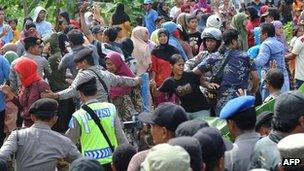Indonesia urged to tackle religious intolerance
- Published

The report wants authorities to have a plan of action to prevent inter-religion clashes
Indonesia is failing to do enough to protect religious minorities from growing intolerance and violence, a report from a rights group says.
The New York-based Human Rights Watch (HRW) says there has been a steady rise in attacks on Christians, Buddhists and Muslim minorities.
Many of these were carried out by Islamist militants, it added.
The government says religious harmony is strong in Indonesia, which has a large Sunni Muslim majority.
HRW said it researched its report, external between August 2011 and December 2012, interviewing more than 100 people of varied religious beliefs.
It included examples of attacks faced by various minority groups, including a mob attack by Islamist militants on the Ahmadiyah religious minority group in 2011 which is said left three men dead.
The report said that "harassment and intimidation of minority communities by militant Islamist groups has been facilitated by the active or passive involvement of Indonesian government officials and security forces".
Those responsible for the attacks received little or no punishment, it says.
In its key recommendations, the report describes President Susilo Bambang Yudhoyono as "inconsistent at best in defending the right to religious freedom".
It urges him to use his authority to defend religious matters.
'Zero tolerance'
The report recommends the establishment of an "independent national task force" with a strong mandate and the resources to implement a religious tolerance and freedoms strategy for the country.
Discriminatory regulations - like the blasphemy law, which it says is biased towards officially recognised religions - be revoked, it says.
There should also be "zero tolerance for attacks on religious minorities", it added.
Phelim Kine, HRW deputy director of Asia, said increased religious tensions could also have an effect on the country's fast-growing economy.
But Bahrul Hayat, secretary general of Indonesia's Religious Affairs Ministry, told the Associated Press news agency that a government survey from last year showed that religious harmony in the country was strong.
"We noted that a few violations happened, but please don't generalise that intolerance has increased in Indonesia," he said.
He added that in some cases, religion was used as a reason for conflicts caused by other issues.
- Published21 April 2011
- Published3 March 2011
- Published8 February 2011
- Published13 September 2010